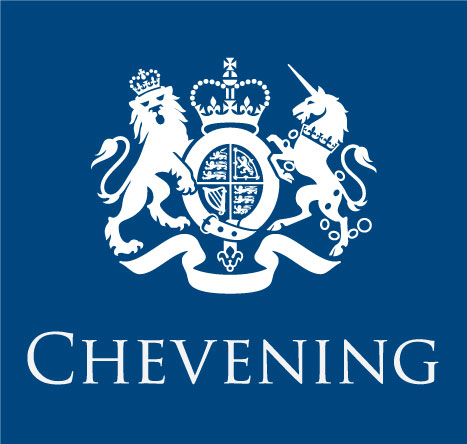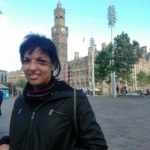18th August 2016 Havana, Cuba
One year as a Chevening scholar – tips, anecdotes and real ale mojitos

Once again, I am delighted to publish a blog by one of the Cuban Chevening scholars currently in the UK. This time Claudia Parera explains how her MSc in Advanced Computer Science at the University of Bradford will help her to focus on the Digital Economy while she also offers useful tips for future scholars. Potential applicants to the Chevening awards will learn first-hand about what it is like to go to study in the UK for a year. And if you are one of them, remember that the next application period opened on 8 August. For more information, visit www.chevening.org. Enjoy the blog! Tim
I have been thinking about writing a blog since arriving in the UK last September. I am glad I didn’t do it until now, as I now realise how much I have learned in just one year. It is impressive!
Currently, I am enjoying the UK summer from inside the university library where I am writing my dissertation. One year ago, however, I was dreaming about the possibility of coming to the UK to study and trying to understand as much as possible about this country and about its people, to prepare myself for the “culture shock”.
I would like to share my experiences with you and what I have learned during my time here. With that in mind, my first tip is:
Tip no. 1 – Try to get involved in all the events the British Embassy in your country organises. The Embassy is a very good open door to UK culture.
What has my Chevening experience been like so far? ….and some other tips….
I arrived here last September with a BSc. in Computer Science from Havana University in Cuba. I am currently studying a MSc. Advanced Computer Science at the University of Bradford. When I graduated, my initial career plan was to devote my next 10 years to developing the Digital Economy. For that reason, I am really interested in everything related to Internet of Things (IoT), Big Data and Smart Cities.
Why did I choose Bradford to study? Bradford is only 15 min from Leeds by train, and Leeds is one of the most important cities in the North of England, located in the western part of the County of Yorkshire. Leeds has been the fastest growing city in the UK and the largest centre outside London for the financial and business sectors. It is predicted that the Digital and Information Economy in Leeds will grow considerably since major organizations such as the BBC, Sky, Sky Betting and Gaming, KPMG and several consultancy firms have software houses there. When it comes to Bradford and Leeds as centres for the development of the Digital Economy, there is great potential since organizations like ‘Digital Catapult Yorkshire’, ‘Leeds Open Data Institute’, ‘Leeds Institute of Data Analytics (LIDA)’, and the ‘Digital Enterprise Zone (DHEZ)’ have projects to speed up the development of the Digital Economy.
How is Chevening related to all of that? Thanks to the Chevening scholarship and the Department of Computer Science at the University of Bradford, I have had the opportunity to collaborate on several projects with some of the above-mentioned organizations. For example, my first collaboration was about encouraging Smart Recycling through an ‘InnovateUK’ funded project in partnership with the University of Bradford and ‘Hebeworks’, one of the growing start-ups in Leeds. At the same time, I have been involved in multiple ‘Data challenge’ events, on subjects ranging from reducing the number of road accidents to tackling Diabetes, which is one of the most pressing health problems the Bradford population faces. I am now working together with one of the local housing providers in the area on a new challenge to make the social housing sector more sustainable.
Encouraging the role of women in technology has also been one of my priorities. I have had the opportunity of being an active ACM (Association for Computing Machinery) women chapter member. Getting involved with organizations such as the Institute of Electrical and Electronics Engineers ( IEEE), the Association for Computing Machinery (ACM) and the British Computing Society (BCS) have been unique opportunities to access exclusive sources of research, and to network.
Tip no.2 – Just get involved and make the most of your time. It doesn’t matter if you don’t have the technical skills, just an idea could make a difference in improving the railway network or reducing the costs of creating a new product for the National Health Service (NHS). I was amazed to see how a 5 year old child was teaching me how to use a Raspberry Pi card in a primary school.
Last but not least, I have also had a lot of fun. Being in the middle of the country has been very convenient for travel to the North to spend New Year’s Eve in Scotland, to enjoy the beautiful Yorkshire countryside where the Bronte sisters lived, to visit York several times, to take a steam train ride, or just to make a simple trip to the Yorkshire coast. Every experience has been different; every town has its own history and traditions and, often, a different accent.
It has been a year full of new experiences, I have learned a lot not just from books and scientific research papers but also from talking to other people, and making friends with British people. They have been really nice and helpful, and there has always been a wise old British man able to explain to me the history of a place I am visiting.
Chevening events have been also a great way of networking and meeting scholars from other countries and different backgrounds. We can go from a casual conversation to really interesting debates on political and economic issues. The welcome and farewell events have been among the most exciting events of the year, and I have been accepting social media requests every 5 seconds to become friends with scholars from many different countries.
Tip no.3 – Network with the Chevening community, with scholars from your own University but at the same time, get to know the local people, how they live, their history, and how they have built the successful country that is the UK. HostUK is a very good experience as I had the pleasure of spending a weekend with a British family.
I have spent my year drinking tea, coffee and, in summer, PIMMs. I have even discovered how to put London and Havana into the same drink: Real Ale Mojitos – which consist of a mix of Cuban rum, Real Ale and mint. This has been my drink of choice for every celebration! To be fair, that has been the only way to avoid complaining so much about the UK weather. How could one write something about a year in the UK and not talk about the weather?
I hope you enjoy your year as much as I have been enjoying mine. The Chevening experience has definitely changed my life and I cannot say how grateful I am for this opportunity.
I really wish you huge success in the future. You can follow me on social media networks or DM me if you have any doubts, or need tips or advice….

Learned a lot from your experience want to have experience of UK and be the part of its universities.
Hi Claudia, I am very pleased to learn about your experiences in the UK and how fruitful and successful was your scholarship. I was also a chevening scholar but many many years ago. I couldn’t agree more with everything you just said. It had an amazing impact on my professional and personal life.